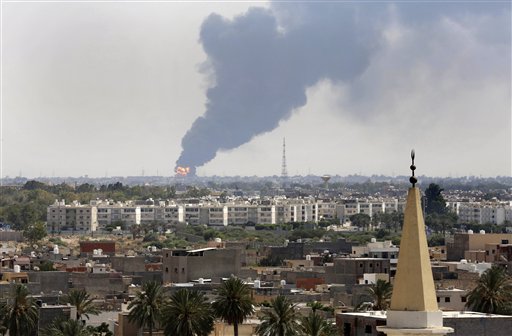CAIRO - Libya's newly elected parliament asked the United Nations for an "international intervention" and voted Wednesday to dismantle the militias responsible for violence raging across the country for weeks.
Libya is witnessing its worst spasm of violence since the 2011 ouster and killing of dictator Moammar Gadhafi as rival militias battled for control of territory and political clout. Thousands have fled the country, including diplomats and foreign nationals, as dozens have been killed in the bloody confrontations. Scores of embassies have closed down and international organizations have shut their offices.
In a move that aimed to stem the violence, the country's newly elected parliament voted to dismantle the rival militias, giving them an ultimatum to join the military and police by the end of the year. Officials repeatedly have tried unsuccessfully to disarm the slew of militias that sprouted in Libya to fight Gadhafi.
It is not clear how Wednesday's decision will be implemented. Details of the decision were not yet worked out.
In a joint statement, the governments of the U.S., France, Germany, Britain and Italy deplored the ongoing fighting and called for "an immediate cease-fire and for all parties in this conflict to begin a peaceful political dialogue."
"We are in particular deeply concerned by the increasing toll the violence is taking on Libya's civilian population and institutions, as well as the threat it poses to Libya's democratic transition," according to the statement released by the U.S. State Department. "We deplore the rise in the number of civilian casualties and express deep concern about the shortages in medical supplies, the displacement of thousands of families, the destruction of residences and infrastructure, as well as the halt in economic activity."
The statement demanded that all sides "recognize the authority of the elected representatives of the Libyan people."
Earlier, U.S. State Department spokeswoman Marie Harf said she was not apprised of the parliament's decision to dismantle the militias and declined to comment on it.
Lawmaker Eissa al-Aribi said the militia members have until Dec. 31 to join the regular forces or to be integrated in other state institutions. Until then, he said, their salaries will be paid. Al-Aribi said violators will face up to three years in prison. Nearly 200,000 people are estimated to be on the government payroll as part of various militias.
Some 102 out of 104 lawmakers in attendance voted in favor of the measure.
The parliament is convening in Libya's eastern-most city of Tobruk, far from the weekslong militia battle over the international airport in the capital, Tripoli, and clashes in the country's second-largest city, Benghazi.
The militias filled a void left by weak police and a shattered army. Successive governments have put militias on their payroll in return for maintaining order, but rivalries over control and resources have led to fierce fighting. The militias are divided along regional and ideological lines, with western and eastern militias as well as Islamists and anti-Islamists pitted against each other.
Lawmakers also adopted a resolution asking the Security Council to intervene in the militia violence. It passed with 111 votes in favor from among 124 lawmakers present.
The new parliament is composed of mostly anti-Islamist politicians.
It was not immediately clear how the U.N. would respond to the Libyan parliament plea but calls for outside help have come from many in Libya. The U.N. mission in Libya- which evacuated because of the violence - has called on warring parties to stop the violence and hold peace talks.
Violence mounted when Islamist-led militias mainly from the coastal city of Misrata launched an attack on the Tripoli airport, under the control of rival militias from the mountain town of Zintan. Analysts believe that the operation came as a backlash to Islamists' devastating loss in last parliamentarian elections and to counter a campaign in Benghazi led by a reneged army general and army units against Islamic militias. At least 250 people have been killed in these clashes.
Meanwhile, random shelling in Tripoli killed three people overnight. Another eight were killed Tuesday night and Wednesday in clashes in Misrata.
